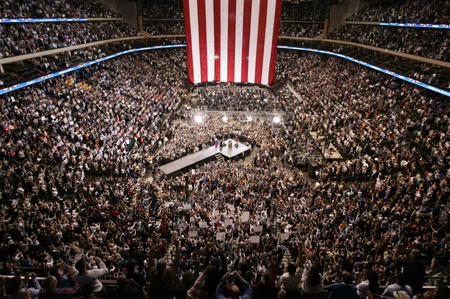Party unity at stake
The contest between Obama and Clinton is believed one of most competitive presidential primary elections in the US history.
In fact, Obama only won six of the 13 races in the last three months, and trailed Clinton in total votes. His victory owes a lotto the 11 consecutive wins after February 5, analysts say.
The long and fierce battle between the two candidates, however, has alienated supporters from both sides. The division was apparent at a meeting of the Democratic National Committee, or DNC, in a Washington hotel last Saturday.
After daylong debates, DNC's rules and bylaws committee finally reinstated all of Florida and Michigan's delegates to its party's presidential nomination convention in August, but delegates from the two states will only have half a vote at the convention because the two states held its primary earlier than the DNC allowed.
The DNC ruling was viewed as favoring Obama and effectively ruined Clinton's last hope to catch up with Obama in delegate tally.
Clinton supporters protested throughout the meeting and threatened to carry the fight all the way to the August convention.
Some of her supporters even said they will defect the party and vote for Republican candidate John McCain in November if Clinton can not get party nomination.
In the May 20 Kentucky primary, two-thirds of Clinton supporters said they will vote for Republican or not vote at all in the general election if Clinton is not the nominee.
For Obama, the top priority is to mend fences with Clinton and unite the party as soon as possible.
Clinton's reluctance to concede the race has made the healing of wounds difficult and put party's unity at risk.

An overall view of the South Dakota and Montana presidential primary election night rally for US Democratic presidential candidate Senator Barack Obama (D-IL) at the Xcel Energy Center in St. Paul, Minnesota June 3, 2008.(Xinhua/Reuters Photo)